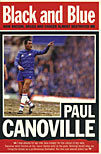 How racism, drugs and cancer almost destroyed me
How racism, drugs and cancer almost destroyed me
by Paul Canoville
Headline, £7.99
Reviewed by Mike Ticher
From WSC 257 July 2008
The only time I’ve been punched in the face at a football match was because of Paul Canoville. I’d like to say it was on account of some courageous protest, but in the early 1980s at Stamford Bridge you only had to clap him to rile his racist tormentors. Canoville was great to watch: an upright, powerful winger with a destructive change of pace. But as Chelsea’s first black player, he was hounded by his own fans on his debut at Crystal Palace in 1982, and long afterwards.
He flourished briefly but, following a confrontation with an (unnamed) player who showered him with racist abuse and attacked him with a golf club, he left for Reading in 1986. After a promising start there, a knee injury ended his career at 24. What Canoville endured was atrocious and significant, but 390 pages still seemed to be stretching it for a career of 95 League games. But football is only a small part of a chaotic, often catastrophic, tale that sometimes seems like a nasty caricature of recent black London history.
Canoville and his ghostwriter, the long-time Chelsea chronicler Rick Glanvill, have no need to sensationalise his life to tell a devastating story. Canoville grew up in Southall, west London, the child of an absent father and distant mother. By his mid-teens he was heavily into football, music, drugs, sex, clothes and crime, not necessarily in that order. At 17 he spent time in Borstal and became a father – the first of 11 children he would have with ten women. Despite horrendous family conflicts and spells of homelessness, he made it at Hillingdon Borough, then Chelsea.
After the injury he briefly had success as a DJ, before becoming addicted to crack. The drug cost him his Second Division championship medal, his painstakingly acquired collection of rare records and, needless to say, any semblance of sane family life. Two gruelling spells of rehabilitation were cruelly laced with a diagnosis of lymph cancer and subsequent chemotherapy.
It often amazes that Canoville played at all. Hillingdon team-mates complained of his BO, not knowing he was living in a car. At the time of the Selhurst Park ordeal he was recovering from a fight with his mother’s partner and sleeping on the floor of a women’s hostel. After his signature game, the 4-4 League Cup draw with Sheffield Wednesday in 1985, he met his father for the first time, in the players’ bar – the next day he was arrested while buying dope. His career ends at Egham Town, playing on one leg, with a serious crack habit and two more babies on the way.
Fortunately for the book, there are relatively few matches to recount (does anyone except journalists really use phrases such as “cross-town rivals”?). The rest comes across as authentic Canoville, with all the pain and self-recrimination you might imagine. Surveying the carnage, he talks sensitively about race, addiction and the roots of his manifest failure to sustain relationships.
Canoville does not shy away from unpleasant truths about Chelsea, but is generous to those who supported him and appreciative of his welcome when he returned in 2005 – although conscious that some cheering fans might have been those who abused him 20 years earlier. Perhaps he can view his shocking treatment with more equanimity partly because he has seen so many other terrible ways that people can be hurt. Sadly for Canoville, racism in football was almost the least of his problems. Luckily for him – and us – he found a way to explain why.